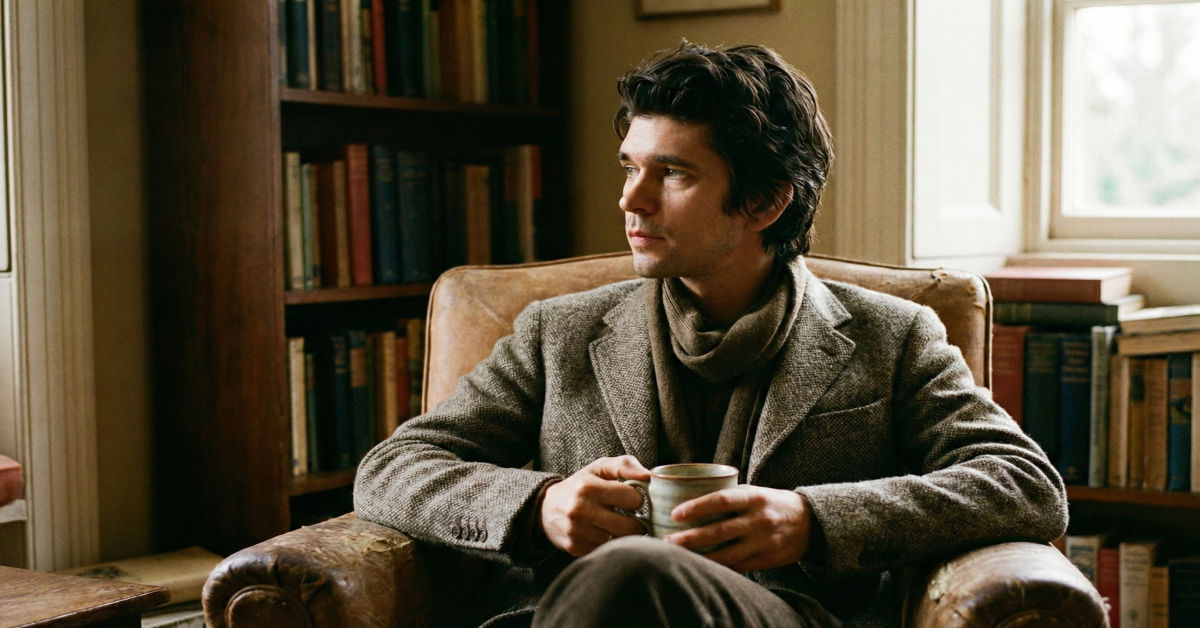Ben Whishaw is one of those actors whose presence quietly permeates modern British film and television gentle yet unforgettable, restrained yet capable of emotional rupture. In the first moments of nearly any role—whether he’s Q in the James Bond franchise, the tender voice of Paddington Bear, or the harried junior doctor in This Is Going to Hurt—he commands attention without demanding it. His name may not always headline cinematic spectacle, but his performances linger far longer than many louder peers.
Born in Clifton, Bedfordshire, on October 14, 1980, Whishaw’s early interest in acting came through youth theatre and community performance. He eventually trained at the Royal Academy of Dramatic Art, graduating in 2003, where his instinct for interiority and textual precision quickly set him apart. That mixture of formal technique and emotional honesty would become the foundation of a career spanning Shakespearean tragedy, blockbuster spectacle, experimental stage pieces, and some of the most acclaimed British television dramas of the century.
Across his work, Whishaw often plays men searching: for identity, for belonging, for meaning within institutions larger than themselves. But he resists the trappings of a traditional leading man. Instead, his performances reflect a belief that truth is found in details—a glance, a breath, a pause. It is this attentiveness that has earned him international awards, devoted collaborators, and a reputation for subtle brilliance.
Early Life and Formative Influences
Whishaw grew up in a modest household with his parents and his fraternal twin brother. His background—part British, part European through his paternal grandfather—shaped a worldview that embraced complexity and cultural layering. While many actors describe an early certainty about their path, Whishaw’s path was more exploratory: he found a sense of belonging in the communal space of youth theatre, where he first experienced the emotional safety and creative freedom that acting could offer.
His formative training at RADA sharpened his instincts without sanding off the vulnerability that would later define his best work. At drama school, he was known for his willingness to try, fail, and try again—sometimes to the point of exhaustion. Teachers and classmates recall him as precise, introspective, and unusually committed to finding the psychological truth of a character rather than relying on theatrical bravado.
These early foundations positioned him to leap quickly into significant stage roles after graduating, and he did so with remarkable speed.
Stage Emergence and Breakthrough Roles
Whishaw’s early stage career unfolded with uncommon velocity. His portrayal of Hamlet in 2004, directed by Trevor Nunn at the Old Vic, became a watershed moment—intimate, cerebral, and unlike any other recent rendering of the role. Rather than playing the prince as a thunderous intellectual, Whishaw approached him as a wounded, contemplative figure navigating private grief and public responsibility.
This production introduced many audiences to his signature quiet intensity. His Hamlet proved that vulnerability could carry a stage as powerfully as command. Critics noted his ability to make familiar lines sound newly minted, and his performance earned an Olivier Award nomination—an early sign that his approach to character would set him apart from convention.
Whishaw continued exploring unconventional theatre: the provocative dystopia of Mercury Fur, the psychological resonance of Some Trace of Her, and later, the existential ache of contemporary adaptations. His stage work rarely chased commercial appeal; instead, he chose pieces that demanded risk, emotional exposure, and moral ambiguity.
Film and Television Expansion
As his stage reputation grew, Whishaw simultaneously built a screen career marked by eclectic choices. Earlier film roles introduced him to international audiences through characters who were often fragile, enigmatic, and haunted. He appeared in crime thrillers, romantic dramas, period films, and psychological character studies, steadily accumulating a body of work that defied categorization.
His breakout in cinema came through roles that required profound internalization: intense young men driven by obsession, longing, or creative ambition. These performances showcased his ability to invite audiences into a character’s private world without overt exposition. Whether portraying a tormented poet or a conflicted outsider, he displayed an emotional transparency that made his characters both relatable and unsettling.
Whishaw carried these skills into television, where he found particularly fertile ground. His performance as an accused young man in a British crime drama brought him significant recognition, and later roles in period anthologies and espionage thrillers demonstrated his capacity for both restraint and rawness.
Prestige television soon became one of his strongest arenas, offering him space to navigate extended emotional arcs with nuance and realism.
The Iconic Roles: Q and Paddington
Two roles—wildly different yet equally emblematic—have shaped Whishaw’s international profile.
As Q in the James Bond franchise, he reinvented the character for a new era. Instead of the gadget-obsessed elder statesman of earlier decades, Whishaw’s Q is young, brilliant, slightly awkward, and deeply principled. He conveys intelligence through precision, not arrogance. His version of Q is a modern technical savant whose understated humor adds texture to the Bond universe.
At the opposite emotional extreme, Whishaw voices Paddington Bear—a role defined by gentleness, optimism, and moral clarity. His vocal performance is remarkably warm and earnest, grounding the CGI bear in old-fashioned kindness. For millions of families, his voice has become synonymous with decency, compassion, and understated comedic timing.
Together, these roles reveal the paradox of Whishaw’s career: he can inhabit the world’s most lucrative franchises while maintaining a persona that feels almost defiantly anti-celebrity.
The Power of Prestige Television
Whishaw’s television work in recent years has produced some of his most acclaimed performances. Through roles exploring personal trauma, institutional failure, and political scandal, he has demonstrated a particular knack for playing characters under pressure—people grappling with systems that both define and constrain them.
His portrayal of a whistleblower in a political drama earned him multiple awards for supporting performance, praised for its blend of vulnerability, humor, and righteous anger. Later, his lead role as a young doctor in a darkly comedic medical series became a cultural touchpoint. The character’s exhaustion, cynicism, and buried grief resonated across audiences and critics alike, capturing the emotional toll of modern healthcare with unflinching honesty.
Whishaw’s television characters often exist in liminal spaces: between authority and rebellion, confidence and collapse, self-protection and exposure. This ambiguity has become a hallmark of his craft.
Personal Identity, Authenticity and Public Life
Whishaw’s relationship with public identity has evolved as steadily as his career. For years he avoided discussing his sexuality publicly, partly out of privacy, partly out of a desire to avoid reductive labels in an industry still attached to narrow definitions of masculinity. When he did speak openly, it was with characteristic humility. He acknowledged the cultural shifts that made such openness easier, while also reflecting on the pressures faced by young queer actors in earlier decades.
His reflections have contributed to broader conversations about representation, authenticity, and the expectations placed upon actors to disclose or perform aspects of their identity. Without positioning himself as an activist, he has articulated a thoughtful, nuanced view: representation matters deeply, but it must be paired with respect for personal complexity.
Whishaw’s reluctance to embrace celebrity culture underscores this perspective. He rarely seeks publicity, preferring to let his work speak for itself. In an age of constant visibility, he remains striking for how comfortably he inhabits quiet.
Key Areas of Work and Artistic Traits
| Medium | Representative Works | Distinctive Qualities |
| Theatre | Hamlet, Mercury Fur, The Seagull | Emotional transparency, intellectual rigor, risk-taking |
| Film | Literary dramas, period pieces, character studies | Subtle expressiveness, controlled intensity, psychological depth |
| Television | Political drama, medical dramedy, crime anthology | Realism, vulnerability, emotional endurance |
Career Milestones
| Period | Milestone | Significance |
| Early 2000s | Breakthrough stage roles | Established him as a major young classical actor |
| 2010s | Franchise recognition as Q | Brought global visibility and widespread acclaim |
| Mid-late 2010s | Acclaimed television roles | Demonstrated versatility across genres |
| 2020s | Bold international film choices | Reinforced his willingness to take creative risks |
Expert Perspectives on Whishaw’s Craft
Critics and collaborators frequently describe Whishaw as a performer who “acts between the lines”—someone who treats silence not as a void but as a dramatic instrument. Directors praise his unshowy precision, noting that he adjusts performances with microscopic shifts of breath or gaze. Fellow actors often comment on his generosity: he listens deeply, reacts authentically, and resists imposing a fixed interpretation on a scene.
Theatre historians have noted that his early stage work helped reignite interest in psychologically nuanced Shakespeare for younger audiences. Film scholars highlight the way his performances resist the traditional binary of “method versus technique,” blending both approaches organically. Casting directors often regard him as a rare performer whose vulnerability feels unmanufactured.
Across commentary, one theme recurs: Whishaw’s performances feel lived rather than performed.
Recent Projects and Artistic Evolution
In recent years, Whishaw has gravitated toward deeply challenging material. He has portrayed complex historical and literary figures with psychological acuity and a willingness to expose discomfort. These roles—sometimes political, sometimes intensely personal—reflect a continued evolution toward bolder creative frontiers.
He has also returned to the stage in introspective, poetic works, exploring themes of memory, longing, and emotional fragmentation. These productions signal his ongoing interest in theatre as a space for experimentation rather than prestige. Meanwhile, his film work has embraced increasingly global perspectives, often engaging with political tension, artistic rebellion, and the complications of modern identity.
Ben Whishaw recent choices indicate a performer uninterested in repeating himself. Instead, he seems to be asking: What human truths remain unexplored? What stories demand quiet intensity rather than spectacle?
Navigating Fame: A Deliberate Quietness
Throughout his career, Whishaw has navigated fame with notable discretion. He engages with interviews selectively, avoids cultivating an online persona, and tends to recede from public conversation when not promoting a project. Yet his absence from celebrity culture has become one of his most intriguing traits.
Friends and collaborators describe him as thoughtful, gentle, and attentive—someone who prefers close circles and private spaces to red carpets. This quietness is not an aversion to connection but a commitment to authenticity. He believes actors should have inner lives protected from professional exposure, a stance that has only strengthened his credibility.
In many ways, Ben Whishaw represents an older model of artistry: talent first, visibility second.
Takeaways
- Ben Whishaw career is defined by subtlety, precision, and emotional vulnerability.
- His early stage work, including a landmark Hamlet, cemented him as a major classical actor.
- Iconic roles such as Q and Paddington showcase his remarkable range.
- Prestige television has provided some of his most emotionally complex work.
- His reflections on identity emphasize authenticity and nuance over labels.
- Critics consistently praise his ability to convey depth with restraint.
- His recent film and theatre choices highlight a commitment to artistic risk.
Conclusion
Ben Whishaw occupies a rare space in contemporary acting profoundly respected, widely recognizable, yet stubbornly resistant to the machinery of stardom. His performances shimmer with humanity—not through spectacle, but through the quiet courage of emotional honesty. Ben Whishaw embodies a deeply modern kind of acting, one built on introspection, humility, and a belief that the smallest gestures can reveal the greatest truths.
As he continues to explore more daring, layered roles, Whishaw offers a powerful counter-narrative to celebrity culture: that an actor’s worth is measured not by visibility, but by integrity. And in his calm, observant way, he has reshaped the boundaries of what it means to be a leading actor in the 21st century.
FAQs
1. What is Ben Whishaw best known for?
He’s widely recognized for playing Q in the James Bond films and voicing Paddington Bear, along with acclaimed roles in television dramas.
2. Where did Ben Whishaw train?
He studied at the Royal Academy of Dramatic Art, where he developed the technical and emotional foundations of his craft.
3. What makes his acting style distinctive?
Whishaw is known for subtle expressiveness, emotional depth, and an ability to convey complex inner life with minimal gestures.
4. Does he prefer stage or screen?
His career spans both, but he often returns to stage work for creative renewal and artistic challenge.
5. How does he approach public life and fame?
Whishaw maintains a deliberately quiet public presence, choosing privacy and meaningful work over broad publicity.







